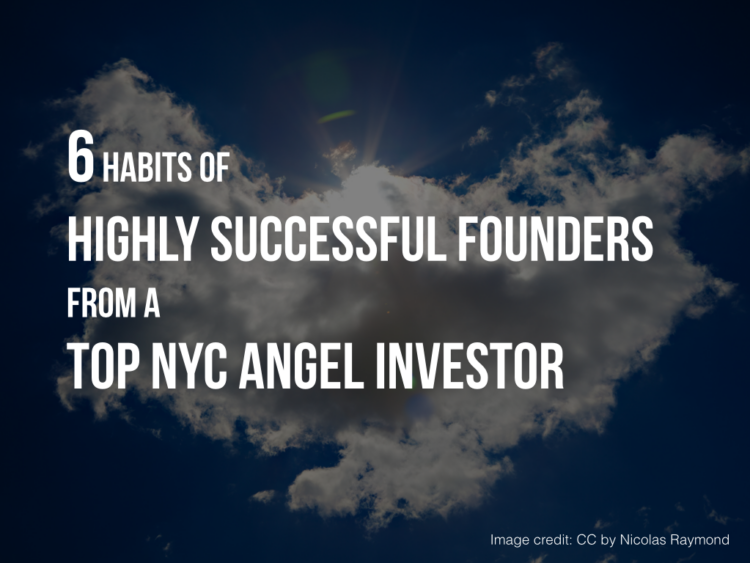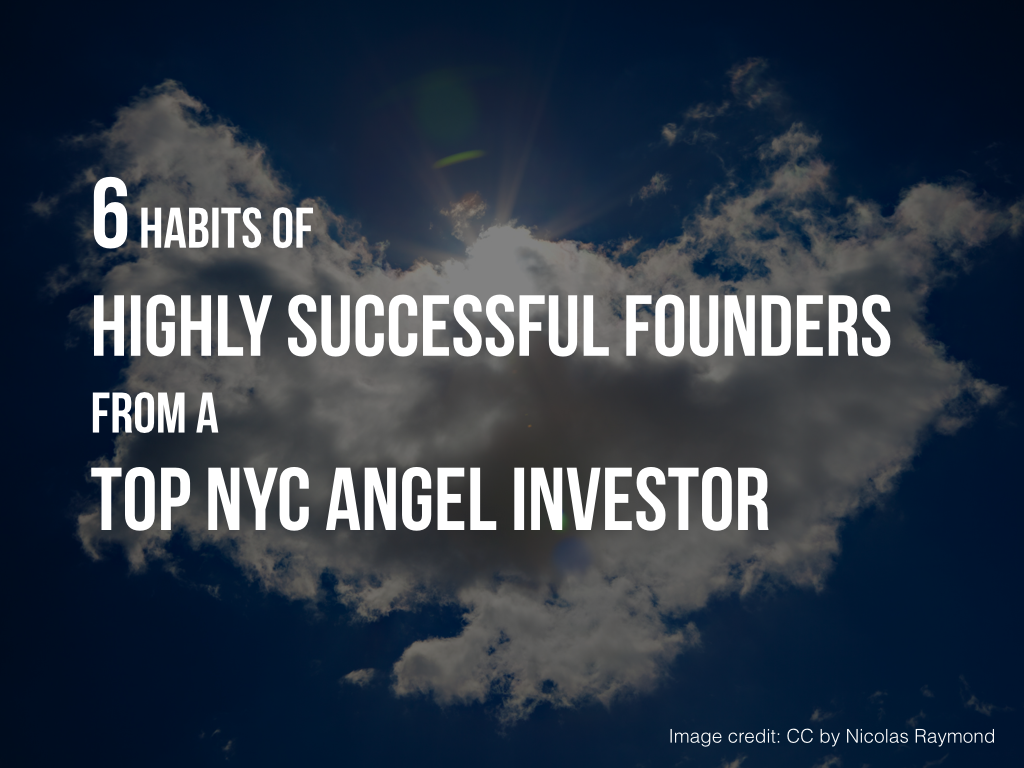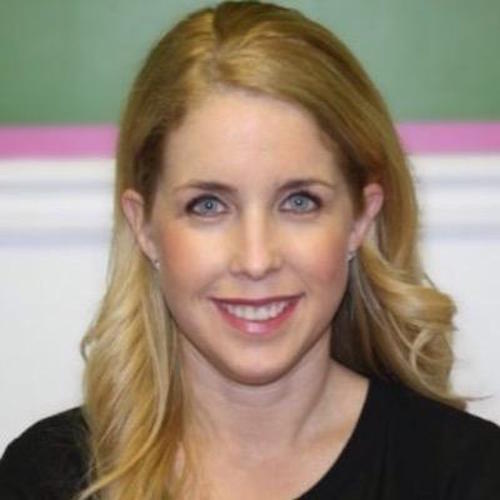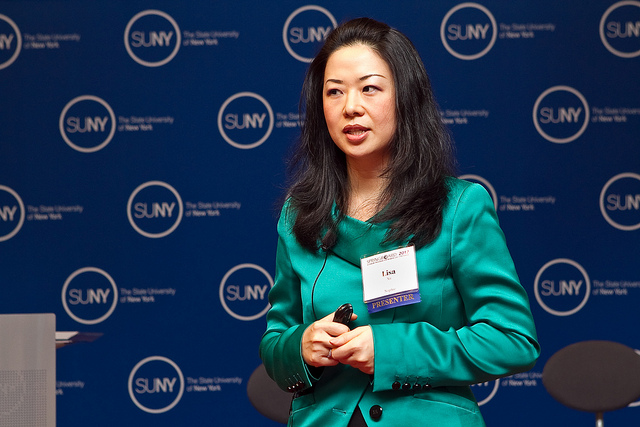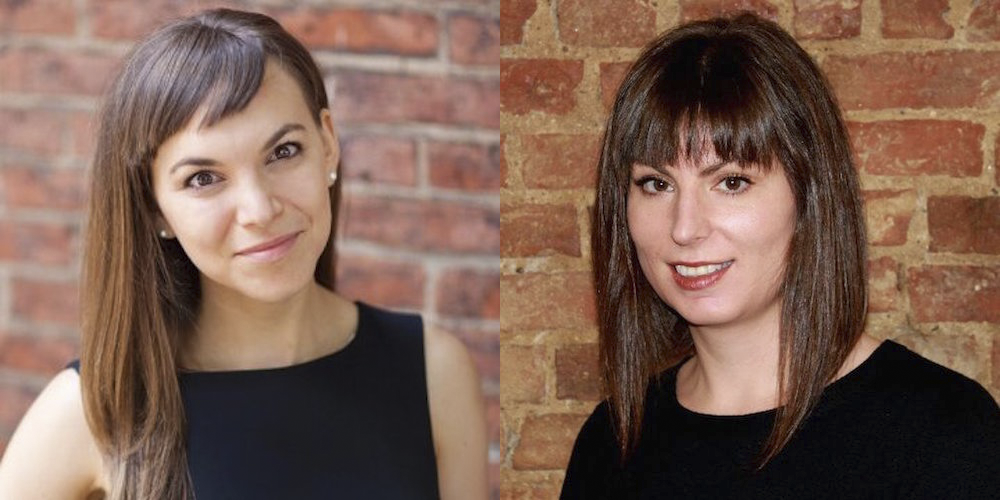So what did I learn in 2014 from some on my startup investees? In this post, I share some of the things I have seen six companies I have invested in do especially well.
Typically posts on what makes a great founder/entrepreneur expand on lists of keywords, most pretty self evident and also often contradictory, when you compare different versions!
Rather than repeat that exercise, I tried to identify more concrete and actionable “habits.” These are nitty gritty execution tactics and strategies that have taught me, as an investor and advisor, a lot of practical startup wisdom.
In no particular order here are my Six Habits of Highly Successful Founders:
CLICK HERE TO SEE THE 6 HABITS YOU’LL WANT TO KNOW GOING INTO 2015
#1. Be the Wizardess of Oz – Kathryn Minshew of The Muse
As I explained to Ben Fisher as The New York Business Journal back in April, “As you’re trying to start a company, in the normal course of events, a lot of very reasonable people wouldn’t give you the time of day, so you have to find a way to make yourself the Wizard of Oz, in that you command more attention that is really justified by the substance.” Or, as I put it in the context of Kathryn Minshew CEO of The Muse, The Wizardess of Oz.
Hopefully Kathryn took that comment as a compliment, although frankly now it is looking dated. From the team of three co-founders hitting Y Combinator back in 2011 The Muse is now a team of over 20 and The Muse web site is approaching 2mn unique visitors/month.
But I think the observation holds true … that in that early phase of a startup, especially when you are selling to skeptical enterprise customers, getting your profile as well as the company’s profile and credibility as high as possible is vital. Get ahead of your startup skis, so to speak. Then, over time, you can earn your way into that stature … and more.
Lesson: Smart startup promotion is a core skill: use it or lose it
Image credit: Twitter
#2. Never, never, never give in – Allison Dorst of Pinks and Greens
It is hard to single out any single entrepreneur for their grit and determination. Because, of course, it goes with the territory. However, speaking as an investor, it is nonetheless impressive to see founders who has bootstrapped themselves to $1mn/year+ in revenues, learning the ins and outs of an entirely new business along the way. This is especially so in the case of Allison Dorst, a founder who was a banker for nine years and decided to learn ecommerce from the bottom up … and built Pinks and Greens in the process.
Needless to say, I have a bias when it comes to the much maligned investment banker class, having been one myself. Although, as I wrote last year, I genuinely believe that ibankers have an intensity of customer focus and timeliness that fits well in startup land. Quite rightly, investors put a high premium on domain expertise and market knowledge.
But in my view, that expertise can be learned and learn quickly, especially by someone working on it 24/7, and who is in constant learning mode – and never gives up. A couple of years of that sort of domain expertise acquisition is a very powerful way to acquire the proverbial “unfair advantage.”
Lesson: Be super persistent and always be learning
Image credit: Twitter
#3. Pitch, pitch and pitch again – Erika Trautman of Rapt Media
Like many (most?) startup CEOs, Erika Trautman of Rapt Media has spent considerably more time than she ever thought likely or even possible talking to money. In the last three years, which have seen her go from multiple notes to an A and most recently a B round, she estimates that fundraising has taken up 40% of her Rapt Media life.
The statistics about the imbalance in funding of women-led companies by angels and even more so VCs, is well known and the issues of unconscious (mostly) bias that lies behind this are complex and subtle. However, as Erika wrote in an article for Entrepreneur Magazine, after talking with 200 investors, she learnt a lot.
Appreciating quickly, if not from the get go, that fundraising is a key part of the CEO’s job description is one of those lessons. But more so, developing your story, told by an authentic you and seeking the investors with whom that story will resonate. As she put it: “ultimately, shrewd tenacity may be even more important than selling the dream.”
Lesson: Pitching is a core function of the CEO – but only pitch as the real you
Image credit: Twitter
#4. Build to scale, before you scale – Lisa Xu of NopSec
I was fortunate to spend the first half of this year as interim CFO at NopSec working with co-founders Lisa Xu (CEO) and Michelangelo Sidagni (CTO) and saw first-hand the value of building “repeatable processes” across a startup before they are needed … so that scaling the business in response to customer demand is much less painful.
Lisa is a master at doing that … with huge benefits to the organization. We all know that cloud based services have made it cheaper and easier than ever to build scalable tech platforms – or at least, an initial MVP. Having used that to validate product-market fit, doing the actual scaling of the businesses involves so much more than buying more computers or storage, however. It involves developing and scaling many interlocking processes from customer acquisition, on-boarding, customer service, finances, HR etc.
However, for many startups, the challenges of scaling across these other dimensions often are faced when, to use an old tech analogy, the rivets start popping out. This is because the processes that enable that broader scaling often feel like bureaucracy for a start up and hence are deemed toxic … until things derail. For example a key employee leaves and folks realize exactly what she/he did and how are not documented or processes that worked for single units just don’t work at 100s never mind 1000s.
As Lisa demonstrates, proactively building processes to scale, before you scale, is a smart move.
Lesson: Don’t just be hands on: be hands ahead
Image credit: CC by springboardent
#5. Win the game of “whack a mole” – Kelsey Recht of Venuebook
A startup is a highly iterative journey. First, working to product market fit, then moving forwards to optimize your product/service and finally, delivery to customers – so testing and learning to identify what works and does not work is critical. Then you quickly fix things that are not working.
As you scale, you always encounter new obstacles. Kelsey Recht, CEO of Venuebook, noted that one of her board members calls it “whack a mole:” ie, you fix one bottleneck and another one is created somewhere else.
I do know that what Kelsey does very well is keeping an open dialogue, where team members feel that they can bring up growth pain points and then address them very quickly. Kelsey’s motto is, “don’t tell me who caused the problem; just tell me how to fix it.”
Besides being a smart way to iterate, embedded in this approach is a strong message about the culture of the firm she is building – problems/issues happen all the time, so surface them, don’t hide them. The whole team benefits when things are more transparent and the focus is on solutions and ceaselessly improving the product and customer experience.
Lesson: There is always a new mole. Whacking it and moving on is a team sport.
Image credit: Twitter
#6. JFDI – Julia Shapiro and Jules Miller of Hire an Esquire
One of the core values that the Hire and Esquire (HaE) co-founders, Julia Shapiro (CEO) and Jules Miller (COO), have instilled at their company is proactivity. That is easy to say … but what does it mean in startup practice?
At HaE, it means “JFDI” (Just f-ing do it!”). In daily routine, when you or I (definitely I) might say “we should schedule a meeting for x” or “we should email y,” Julia and Jules pause and just do it at that very moment. Think of it as a procrastination embargo.
A specific example of how this works beyond the day to day of office life came about when they talked “legal tech collaboration” with another legal tech entrepreneur at a happy hour. In that dialog, they and came up with the idea of a legal tech demo day to bring customers to HaE. What next? JFDI! So over the next few weeks they planned it and made it happen, starting with EvolveLaw Demo Day at WeWork with 25 people. Next: iteration – working with Stanford CodeX to host an event with 150+ people.
Julia and Jules believe that they have successfully instilled the JFDI approach in (most – it’s a never ending education process) of their team. And they are delighted to see how much team members get done when the co-founders aren’t bottlenecks! But for JFDI to work, a) you have to trust your team and crucially, b) you need to make sure that your team members have a clear sense of the company’s priorities to frame their independent decisions.
Lesson: JFDI – it’s as simple as that!
Image credit: Twitter


